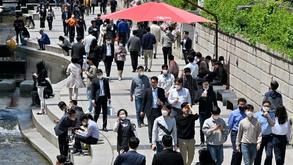 People walk along the Cheonggye stream in Seoul on May 2, 2022. (JUNG YEON-JE / AFP)
People walk along the Cheonggye stream in Seoul on May 2, 2022. (JUNG YEON-JE / AFP)
SEOUL - South Korea's unemployment rate fell to historic lows in August as more of the elderly population entered the workforce to fill vacancies, likely pushing wages higher and triggering further interest rate hikes by the Bank of Korea.
The seasonally adjusted unemployment rate for August fell to 2.5 percent from 2.9 percent in July, the lowest since the data was first released in June 1999, as the number of people in work increased for an 18th straight month, official data showed on Friday.
Such tight labor market underpins expectations for at least two further interest rate hikes by the BOK in this year's two remaining policy rate reviews, slated for Oct 12 and Nov 24: The shortage of available labor adds to the risk of a wage price spiral at a time when headline consumer inflation is still near a 24-year high level.
Most economists expect the BOK to raise the interest rate to either 2.75 percent or 3.00 percent by the year-end, from 2.50 percent currently, in an effort to quell inflation, even as the central bank sees economic growth slowing to 2.6 percent this year from 2.7 percent previously.
The number of employed people increased by 807,000 compared with the same month a year earlier. The pace of gains though was milder, with the number of people joining the workforce 826,000 in July and 841,000 in June
"With the labor market still tight, we continue to expect the Bank of Korea to raise its policy rate by 25 bp (basis points) in October and November, hitting 3.00 percent by year-end," said Brian Tan, an economist at Barclays Bank.
"While the recent export slowdown will likely weigh on the central bank's considerations on the pace of rate hikes, it is unlikely to bring the normalization cycle to an end on its own."
ALSO READ: As S. Korea moves to expand nuke power, disquiet grows
The number of employed people increased by 807,000 compared with the same month a year earlier. The pace of gains though was milder, with the number of people joining the workforce 826,000 in July and 841,000 in June.
"Employment growth is expected to slow going forward as uncertainties are increasing on worsening external conditions and weaker consumption due to high inflation and interest rate hikes," vice-finance minister Bang Ki-sun said at an economic policy meeting after the data release.
READ MORE: Aging South Korea on track to edge Japan for unwanted title
Although drum-tight, the job market remains a source of concern, economists say, with more than half of the people who joined the workforce in August being 60 or older.
The increase was driven mostly by the manufacturing sector, which added 240,000 employees, the biggest monthly growth under sector categories introduced in 2013, followed by health and social welfare services with 123,000 jobs and agriculture and fisheries with 9,000.


